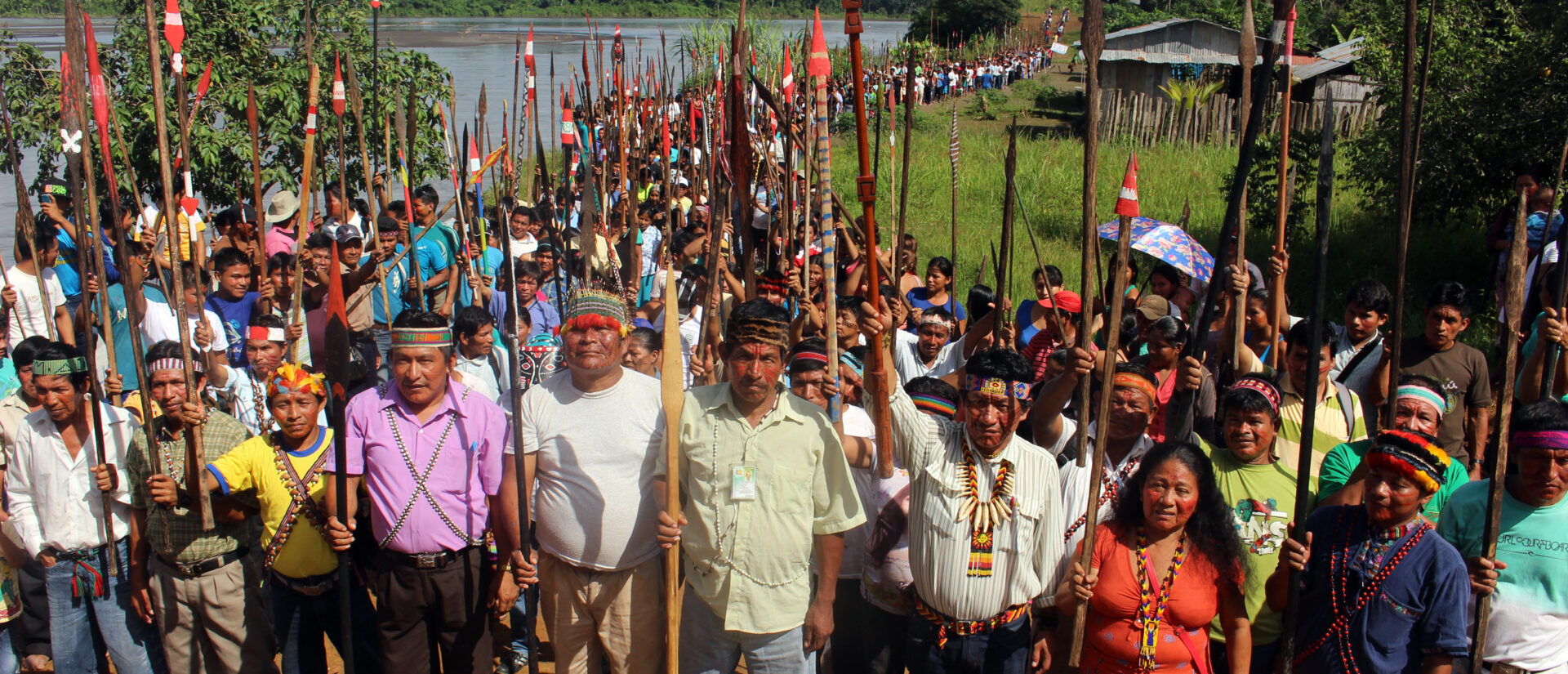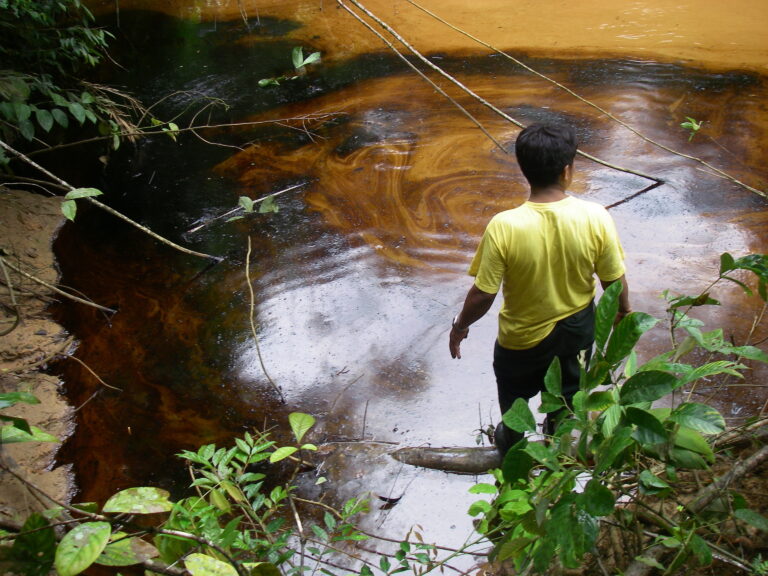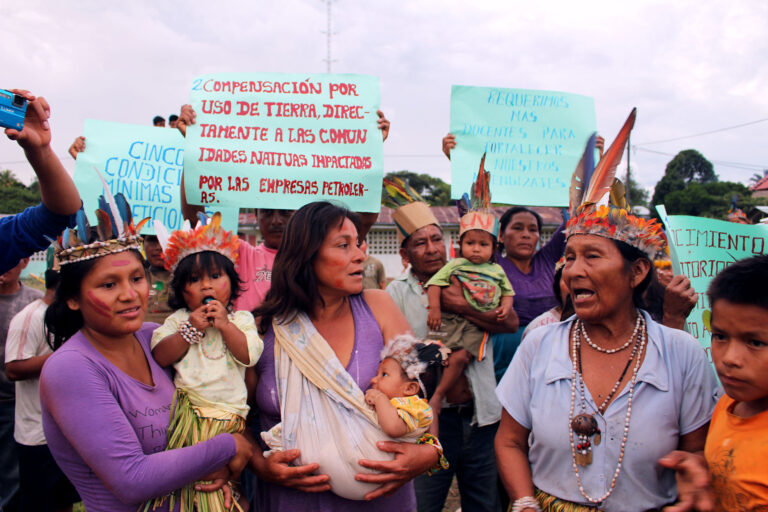
Dutch NCP accepts complaint by Amazon Indigenous Peoples, oil multinational Pluspetrol refuses mediation
The Dutch National Contact Point for the OECD Guidelines today announced(opens in new window) they would accept a complaint against Pluspetrol, a multinational oil firm headquartered in an Amsterdam mailbox. The decision gives Indigenous communities in the oil fields of the Peruvian Amazon a path for seeking remediation from Pluspetrol for the tainted soil and waterways that have harmed the communities’ health and way of life.
Complaint against “Dutch” oil company Pluspetrol for violation of OECD guidelines
Four federations representing more than 100 communities from the Indigenous Quechua, Achuar, Urarina, Kichwa and Kukama filed the complaint against Pluspetrol in The Hague on March 11, 2020. They were joined by Peru EQUIDAD, Oxfam in Peru, SOMO and Oxfam Novib.
The plaintiffs seek remedy for damages done to the Amazonians by pursuing charges against the formerly Argentine oil company for behaviour that violates the Organisation for Economic Co-operation and Development’s (OECD) Guidelines for Multinational Enterprises.
Today’s announcement came after Pluspetrol refused the mediation offer from the Dutch National Contact Point (NCP) for the OECD.
The company’s decision is expected to strain its relationship with the government of the Netherlands, possibly limiting access to benefits of Dutch state support, including export credit guarantees, participation in trade missions, public procurement contracts, and its ability to take advantage of the country’s bilateral trade agreements for protecting its interests.
“In addition to causing, contributing to and failing to remediate environmental and human rights impacts in Peru,” the complaint states, “Pluspetrol has used artificial tax avoidance structures, including offshore trusts and empty letterbox companies without employees to hide assets and profits and to avoid paying its fair share of taxes, in breach of OECD Guidelines provisions on disclosure and taxation.”
The complaint argues that Pluspetrol through its lightly-staffed Dutch headquarters, has set up numerous tax constructions that enable it to avoid taxes by operating through other jurisdictions, including those of Luxembourg and the Bahamas.
Acceptance of the complaint sets an important international precedent, according to Joseph Wilde-Ramsing (SOMO): “For the first time, the Dutch National Contact Point for the OECD has declared admissible a complaint that not only addresses the behavior of multinationals with regard to the environment and human rights, but also the use of the Dutch system for avoiding taxes.”
Normally, the OECD contact point in the Netherlands would begin negotiations between Pluspetrol and the four Indigenous communities to determine what the company must do to repair damages.
Because Pluspetrol rejected this process, the Dutch OECD contact point will now investigate the company’s behaviour on its own and issue a public statement on whether Pluspetrol acted in accordance with the Guidelines. This could have financial consequences for the company.
“It is very good news that the complaint is accepted,” said Aurelio Chino, president of the Indigenous organisation FEDIQUEP. “But we see that Pluspetrol once again refuses to talk about its responsibilities, and, as the company exits, it appears to be fleeing, making clear it does not wish to take the necessary measures to clean up the chaos and contamination.”
Recently, he added, the communities’ pursuit of justice for past wrongs has taken on new urgency.
In December, Pluspetrol announced the liquidation of its Peruvian subsidiary, Pluspetrol Norte S.A., quickly and unexpectedly abandoning Block 8, before 2024, when the contract will end. With this action, Pluspetrol Norte has signaled it will leave Peru without undertaking the environmental remediation of close to two thousand contaminated sites in Block 1AB and more than 1,300 in Block 8.
“It is outrageous that the ‘Dutch’ Pluspetrol refuses to cooperate with a government agency. There should be no place in the Netherlands for this kind of company,” says Wilde-Ramsing. “For years, the Netherlands has played a pivotal role in the tax trickery of these types of multinationals, it is high time to put a stop to this.”
The company will now limit its activities to a gas project elsewhere in the country. By taking actions that appear to help it avoid responsibility for paying taxes and for remediating the harm done to Amazonian communities in Peru, Pluspetrol’s corporate structure, like that of other Dutch “letterbox companies,” has come under increased scrutiny, as documented and noted in the complaint.
“Pluspetrol has polluted almost two thousand different sites in the Amazon by discharging toxic wastewater and allowing oil to leak out,” says Imke Greven of Oxfam Novib “The company refuses to cooperate and take responsibility for the pollution of the habitat, and therefore the health of the affected communities. It seems that justice does not exist.”
In addition to other official reports cited in the complaint, a 2017 study found that the Dutch company’s dumping practices had resulted in widespread contamination of natural water courses and high downstream concentrations of chloride, barium, hexavalent chromium, cadmium and lead.
“These Indigenous communities have had to seek justice in the Netherlands, outside of a court of law, because the Peruvian state has been unable to guarantee that Pluspetrol will meet its obligations to the Peruvian people,” said Yaizha Campanario, from Perú EQUIDAD. “The company has a long history of failing to comply with environmental standards and of contesting sanctions and corrective measures ordered by Peruvian environment agencies.”
“If Pluspetrol does not pay to clean up the mess left behind in one of most biodiverse regions of the Amazon, then Peruvian citizens will have to pay with their taxes, since Indigenous communities continue to live surrounded by contamination,” Campanario said.
OECD Guidelines
The OECD Guidelines for Multinational Enterprises(opens in new window) make clear what the governments of the OECD countries, including the Netherlands, expect from internationally operating companies in the field of corporate social responsibility. Among other things, the OECD considers it important that companies report how they comply with these guidelines.
In 2019, a Dutch government study found the Dutch oil and gas sector was “failing to implement the standards contained in the OECD Guidelines”. Minister Kaag (Foreign Trade and Development Cooperation) urged the Dutch oil and gas sector to come up with an action plan to improve compliance with the Guidelines by the first quarter of 2020. That plan has not materialised. In February this year, the Dutch national contact point for the OECD ruled(opens in new window) that Royal Dutch Shell is also not acting in line with OECD guidelines.
Do you need more information?
-

Joseph Wilde-Ramsing
Advocacy Director
Partners
Related content
-
 Complaint against “Dutch” oil company Pluspetrol for violation of OECD guidelinesPosted in category:NewsPublished on:
Complaint against “Dutch” oil company Pluspetrol for violation of OECD guidelinesPosted in category:NewsPublished on: -

-

